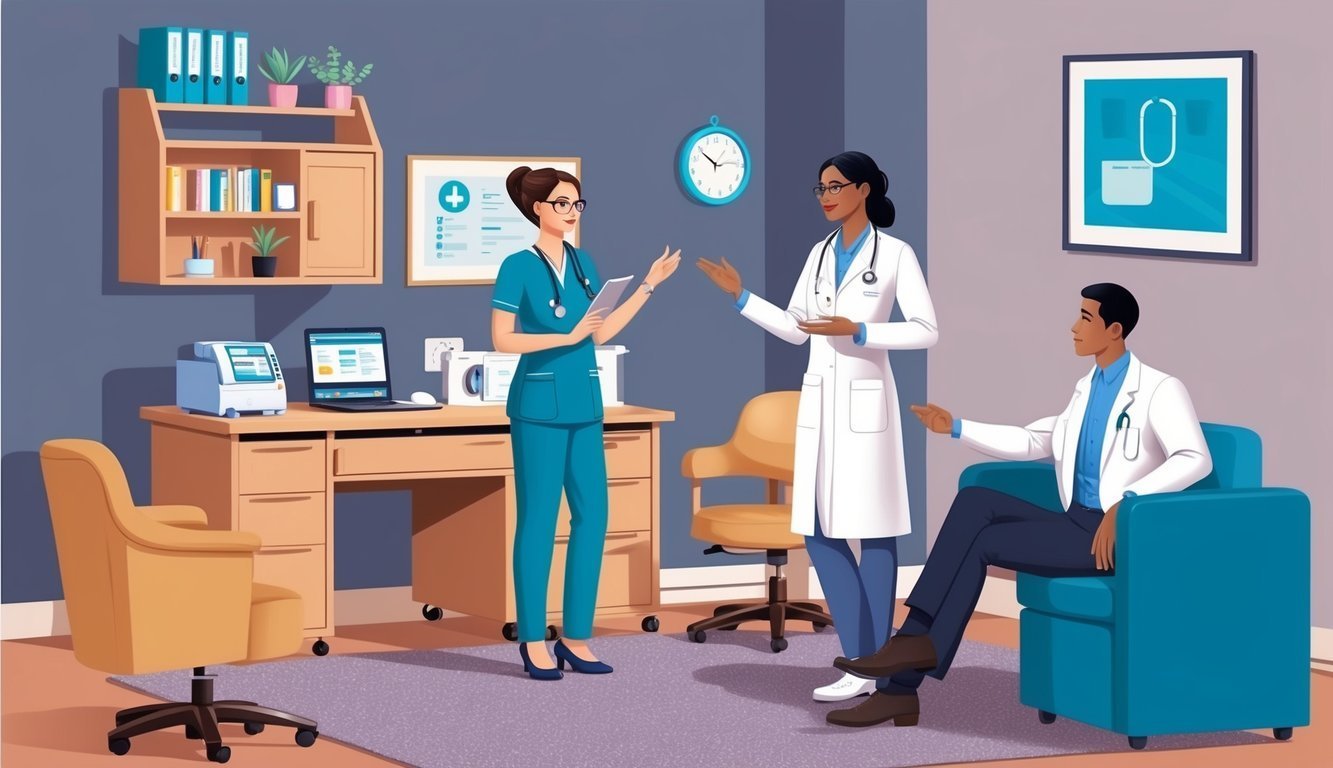Navigating the landscape of mental health care can be daunting, especially when deciding between a psychiatric nurse practitioner and a psychiatrist.
Both roles are essential in providing treatment for various mental health conditions, but they differ significantly in training, responsibilities, and services offered.
Understanding these differences can help you make informed decisions about your mental health care options.
A psychiatric nurse practitioner (PNP) is equipped to conduct assessments, diagnose disorders, and implement treatment plans, including psychotherapy and medication management.
In contrast, psychiatrists, who are medical doctors, perform similar roles but have more extensive training, particularly in medication therapies.
They can also engage in complex diagnostic and therapeutic practices for severe mental health issues.
Choosing the right provider hinges on your specific needs and the level of care required.
Whether you are considering therapy, medication, or a combination of both, knowing who can best support your mental health journey is crucial.
Exploring the unique roles of psychiatric nurse practitioners and psychiatrists will empower you to make choices that align with your health goals and circumstances.
For further insights, refer to resources detailing the differences between these professionals, such as NurseJournal and Registered Nursing.
Educational Pathways and Certification

Navigating the educational and certification pathways is crucial for aspiring psychiatric nurse practitioners and psychiatrists.
Understanding the specific requirements can help you make informed decisions about your career in mental health care.
Essential Educational Requirements
To become a psychotropic nurse practitioner (PMHNP), you typically need to start with a Bachelor of Science in Nursing (BSN).
After obtaining your BSN, you’ll need to pass the NCLEX-RN exam to become a registered nurse (RN).
Following this, you can pursue a Master of Science in Nursing (MSN) or a Doctor of Nursing Practice (DNP) program specializing in psychiatric-mental health.
In contrast, psychiatrists must complete an undergraduate degree, followed by medical school to earn an M.D. or D.O. degree.
After medical school, they undergo a residency in psychiatry, which can last between four to five years.
This extensive training is essential for diagnosing and treating mental illnesses.
Licensing and Certification Standards
After completing your educational requirements, you must achieve the appropriate licenses and certifications to practice.
For PMHNPs, certification is awarded upon passing the board certification exam provided by the American Nurses Credentialing Center (ANCC).
This certification is valid for five years and requires continuing education to maintain.
A PMHNP may have full practice authority, allowing them to diagnose and treat patients independently in many states.
On the psychiatrist’s side, after completing residency, you can obtain board certification from the American Board of Psychiatry and Neurology.
This certification also requires candidates to pass an exam, ensuring they have the knowledge and skills necessary for effective patient care.
Psychiatrists maintain their certification through ongoing education and periodic re-evaluation.
Roles and Responsibilities in Mental Health
In the realm of mental health, psychiatric nurse practitioners and psychiatrists play distinct yet complementary roles.
Understanding their specific scopes of practice and specializations can guide you in recognizing who may best meet your mental health needs.
Scope of Practice for Each Profession
Psychiatric Nurse Practitioners (PNPs) are advanced practice registered nurses who focus on mental health.
They are qualified to conduct psychiatric assessments, diagnose mental health conditions, and develop treatment plans.
PNPs often utilize a holistic approach, integrating psychosocial and physical health care.
| Role | Responsibilities |
|---|---|
| Psychiatric Nurse Practitioner | Assess patients, diagnose, manage care, prescribe medications, and provide therapy. |
| Psychiatrist | Perform in-depth evaluations, prescribe medications, and may conduct research on mental illnesses. |
Psychiatrists, as medical doctors, have a broader scope.
They can also specialize in areas like child and adolescent psychiatry, forensic psychiatry, geriatric psychiatry, and addiction psychiatry.
Treatment and Care Specializations
PNPs and psychiatrists specialize in various treatment strategies tailored to individual needs.
PNPs are skilled in providing therapy, including cognitive-behavioral therapy (CBT) and medication management.
Their focus is on chronic conditions like anxiety and depression.
Psychiatrists engage in more advanced psychopharmacology, prescribing medications such as antidepressants or antipsychotics.
They conduct comprehensive evaluations, ensuring the best treatment strategy for complex mental health disorders.
Both practitioners collaborate on care plans, aiming to improve patient outcomes.
By understanding their roles and specialties, you can make more informed decisions regarding your mental health care.
For further information on the responsibilities of these professionals, visit NurseJournal.org.
Work Environments and Patient Populations

Understanding the work environments and the patient populations that psychiatric nurse practitioners and psychiatrists serve is critical for making an informed career choice.
Each role offers unique settings and demographics that influence how care is delivered.
Settings Where Professionals Practice
Psychiatric nurse practitioners (PNPs) and psychiatrists work in various settings that cater to diverse patient needs.
Common environments include:
- Hospitals: Both roles often function in emergency departments or inpatient units, addressing acute psychiatric crises.
- Private Practice: Many practitioners opt for private settings, allowing for tailored approaches to individual patient care.
- Outpatient Clinics: These facilities offer structured treatment for mental health disorders, enabling PNPs and psychiatrists to manage ongoing patient needs effectively.
- Counseling Centers: Collaborative efforts at community counseling centers support individuals in navigating mental health challenges.
- Psychiatric Hospitals: These specialized institutions focus on intensive treatment, providing important support for severe mental illness.
- Community Health Centers: Here, professionals address both mental health and general health needs for underserved populations.
These varied environments highlight the flexibility and adaptability required in mental health care.
Demographics of Patient Care
The demographics of patient populations encountered by PNPs and psychiatrists can be quite broad.
Key patient groups include:
- Adults: Many seek help for conditions such as depression, anxiety, and mood disorders.
- Children and Adolescents: This group often requires specialized interventions addressing developmental and behavioral issues.
- Substance Use Disorders: Both roles commonly treat patients battling addiction, which necessitates integrated care approaches.
- Elderly: Older adults may deal with unique psychiatric challenges, such as dementia and depression linked to chronic illnesses.
Understanding these demographics allows you to tailor treatment approaches to meet the specific needs of each group effectively, ensuring that patient-centered care remains a priority.
Salary and Job Outlook

Understanding salary differences and job outlook for psychiatric nurse practitioners (PMHNPs) and psychiatrists is crucial as you consider career options in mental health.
The following sections outline key economic considerations and future demand for these professionals.
Economic Considerations
The average annual salary for psychiatric nurse practitioners can vary significantly based on location, experience, and work setting.
According to various reports, the average salary for PMHNPs is around $119,500, while psychiatrists earn approximately $247,350 annually.
Below is a comparison:
| Profession | Average Annual Salary |
|---|---|
| Psychiatric Nurse Practitioner (PMHNP) | $119,500 |
| Psychiatrist | $247,350 |
The median annual wage for PMHNPs reflects the growing demand for these roles.
Factors influencing salaries include geographical location and specific certifications.
You may find substantial differences in compensation between urban and rural areas.
In high-demand states, salaries for both roles can exceed these averages.
Projecting Future Demand for Professionals
The demand for mental health services continues to rise, making the outlook for both PMHNPs and psychiatrists promising.
The Bureau of Labor Statistics forecasts a significant growth rate for these positions.
- PMHNPs: The psychiatric-mental health specialty is attracting many nurse practitioner students due to a growing awareness of mental health needs.
- Psychiatrists: There is an increasing recognition of mental illness, with over 1 in 5 U.S. adults affected.
As the supply of trained professionals lags behind this demand, both fields are expected to see job openings expand.
You can explore more about job forecasts through the Bureau of Labor Statistics.
Training and Continuing Education

The training and continuing education for psychiatric nurse practitioners (PNPs) and psychiatrists differ significantly, reflecting their unique roles in mental health care.
Understanding these pathways is essential for anyone considering a career in psychiatry or as a nurse practitioner.
Advanced Training Opportunities
Becoming a psychiatrist requires extensive education, including a bachelor’s degree, medical school, and completion of a residency program in psychiatry, which typically lasts four years.
During this residency, you engage in clinical rotations that cover various specializations within psychiatry, such as child psychiatry or geriatric psychiatry.
In contrast, if you pursue a career as a psychiatric-mental health nurse practitioner (PMHNP), you first complete a registered nursing program, followed by obtaining a Master’s or Doctoral degree in nursing with a specialization in psychiatric-mental health.
This path often requires fewer years of formal education and allows you to enter the workforce sooner.
Both professions require certification; psychiatrists are board-certified through the American Board of Psychiatry and Neurology, while PNPs gain certification through the American Nurses Credentialing Center.
Lifelong Learning and Skill Development
Both psychiatric nurse practitioners and psychiatrists need to continue their education.
This ongoing learning helps them stay current with the latest advancements in psychiatric care.
Psychiatrists usually participate in formal continuing medical education (CME) programs.
They attend workshops, seminars, and conferences.
Psychiatrists must also fulfill state licensure requirements.
These often include a specified number of CME credits.
Similarly, PNPs engage in lifelong learning through workshops, online courses, and professional development seminars.
Many states require PNPs to undertake continuing education to maintain licensure and certification.
This commitment to ongoing education ultimately enhances their skills and improves patient outcomes in mental health care.

